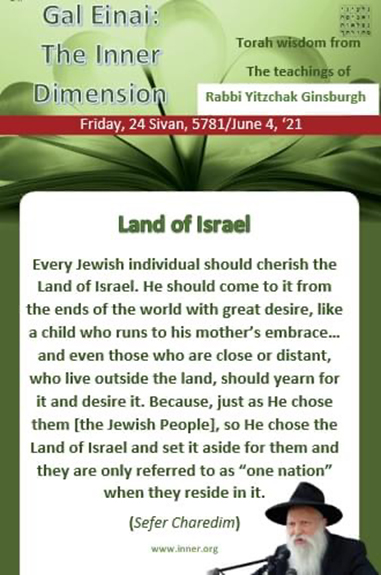A contemporary leader in Chabad publicizes the call to return to the Holy Land. * We are destined to inherit three more lands, representing graduating from character refinement to the expansion of mind.
By Rabbi Boruch Merkur

Although in Chabad, traditional Zionism was never widely embraced, at some point we will all make Aliya.
Wise leaders have the foresight to call the times. The esteemed Lubavitcher chassid and mekubal, Rabbi Yitzchak Ginsburgh of Kfar Chabad, is saying the time is now.
In the wake of the recent missile fire on Israel and increasing aggression against Jews around the world, rachmana litzlan, Rabbi Ginsburgh’s outreach began to focus more on solidarity with the Jews who live there, as well as the appreciation of the Land itself. Most notably, just before Shabbos Parshas Shlach, Rabbi Ginsburgh publicized a call to return to the Holy Land:
Every Jewish individual should cherish the Land of Israel. He should come to it from the ends of the world with great desire, like a child who runs to his mother’s embrace …
Even those who are close or distant, who live outside the Land, should yearn for it and desire it. Because just as G-d chose the Jewish people, so He chose the Land of Israel and set it aside for them. They are only referred to as “one nation” when they reside in it.[1]
Historically in Chabad, love of the Holy Land was often expressed through the maxim, “Mach da Eretz Yisroel - Make the place where you are the Land of Israel,” a spiritual transformation of the Diaspora. But here is a call to move to the Holy Land in the literal sense.
*
Thirty years ago, the Rebbe spoke about the expansion of Eretz Yisroel as the dawn of a new spiritual era, a new mission or conquest:
Chassidus[2] explains that the verse, “Do not harass Moav,”[3] teaches that throughout the regular course of history, before the Messianic Era, Jews are given only the Seven Lands of K’naan. In terms of Divine service, these lands correspond to the refinement and purification of character, which is defined by Seven Attributes, Sheva Middos. (When character refinement is the goal, the Three Aspects of Mind, Gimmel Mochin, are engaged predominately for the sake of influencing character.)
In the time of the true and complete redemption, however, all Ten Lands will be given (i.e., the Seven Lands of K’naan plus the lands of Keini, K’nizi, and Kadmoni), reflecting the ultimate perfection of Divine service. Avoda will then engage the Three Aspects of Mind (even) as they are independent of character refinement …
FN 35: A forerunner to this expanded conquest has already taken place, with the Biblical account in Parshas Chukas of conquering and settling the lands of Sichon and Og, which include a portion of Amon and Moav,[4] two of the three lands (Keini, K’nizi, and Kadmoni) the Jewish people are “destined to inherit.”[5]
The complete conquest and inheritance of the Holy Land in the Future Era (the 10 Lands) begins with and is prepared for by the settling of the lands of Sichon and Og in Parshas Chukas. The revelation of the Three Aspects of Mind, however, can be experienced now by spreading the wellsprings of Chassidus outward …
As a result of our initiative, the lowest dimension of consciousness (avodas ha’tachton*), which reaches higher than Divine inspiration that shines unsolicited** … Creation undergoes an expansion and innovation (hosafa v’chiddush).
*FN 47: To note that the phrase, “(kodesh) mila b’garmei – the word ‘kodesh’ is standalone [implying inherent holiness, albeit conveyed by human effort, such as in tithing livestock – “the tenth shall be holy”] is in Targum, “translated” (into Aramaic, not Lashon HaKodesh, the Holy Tongue), signifying our contribution and effort exerted upon the world as well as the impression left upon it.
**FN 48: As explained in several places regarding the advantage inspired On High from mortal initiative compared to unsolicited Divine inspiration.[6]
After centuries of rectifying and refining the world, we are expected to already possess impeccable character and inherent goodness. We must now step up to the next level and turn our attention to the conquest of mind. By immersing ourselves in Chassidus, spreading the wellsprings in a way that is authentic and inspiring, we will transform the world and experience the Holy Land to the fullest.
[1] Seifer Chareidim
[2] The Mitteler Rebbe D’varim Vol. 1, beg.
[3] D’varim 2:9
[4] Gittin 38a
[5] Rashi on Ibid.
[6] Seifer HaSichos 5751, pg. 669-671